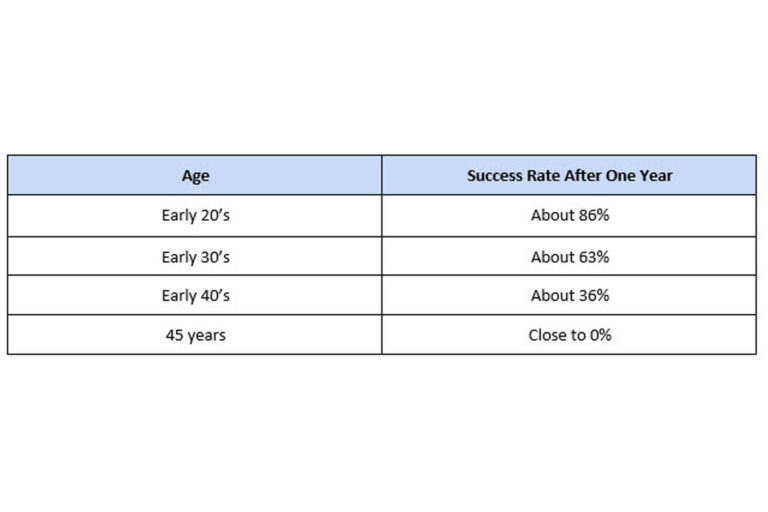CALCULATING HOW LONG DOES IT TAKE TO GET PREGNANT
When you’re trying to conceive, you can’t help but wonder, “how long does it take to get pregnant?” Unfortunately, human beings are the most inefficient mammals when it comes to reproduction. In any given month, a perfectly healthy couple (good eggs and sperm, a healthy uterus and open fallopian tubes) only has a 15-18% chance of conceiving.
In fact, the American Society for Reproductive Medicine found that “a healthy 30-year-old woman has about a 20% change of getting pregnant each month. Then, by age 40, her chance drops to only a 5% likelihood that she will conceive in a given month.”
While these percentages might seem daunting – especially as you age – on average, most couples conceive within six months to a year, with about 80% of couples getting pregnant after six months of trying. However, as you wait it’s perfectly normal to wonder how long it will take to get pregnant. The time may feel like forever with unsuccessful attempts along the way. Not to mention, many women may feel more pressure as they get older.
INCREASING YOUR CHANCES FOR CONCEPTION
Timing & Ovulation. Ovulation refers to the days in a woman’s menstrual cycle when pregnancy is possible and is sometimes referred to as the “fertile window.” As with all things pregnancy-related, this varies from woman to woman and depends on the length of the menstrual cycle.
If you know your average menstrual cycle length, you can work out when you ovulate. Ovulation happens about 14 days before your period starts.
For example, if your average menstrual cycle is 28 days, you ovulate around day 14, and your most fertile days are cycle days 10, 11, 12, 13, and 14. Your egg can only be fertilized for up to 24 hours after ovulation. If it isn’t fertilized, the lining of the womb is shed along with the egg and your period begins, marking the start of the next menstrual cycle.
If you are overwhelmed, there are some helpful pregnancy apps like Glow that will help you calculate your “fertile window” and more.
FACTORS THAT CONTRIBUTE TO CONCEPTION
Lifestyle Choices. Certain lifestyle choices like maintaining a healthy body weight, not smoking, moderate alcohol consumption, limiting caffeine intake, and reducing stress can all have a positive impact on your fertility health.
Age. Experts say a woman’s best reproductive years are in her 20’s, with most women reaching peak fertility between the ages of 23 and 31. Keep in mind, however, in your early 30’s, your chances of conceiving are only slightly lower than in your late 20’s.
This decrease is because the quality and quantity of a woman’s eggs decline with age. A girl is born with 1-2 million eggs. By the time she hits puberty, she has about 250,000-500,000. At age 30-35 a woman has around 25,000 eggs and enters menopause when she has less than 1,000 eggs. For some perspective, the following table highlights the success rates of healthy, fertile women after one year of trying by age:

As you can see from the table above, fertility starts to decline for women from about the age of 30, with percentages decreasing more rapidly from the age of 35.
WHEN TO SEE A DOCTOR
If you’re under age 35, it is recommended to try to get pregnant for at least a year before testing or treatment. If you’re between 35 and 40, discuss your concerns with your doctor after six months of trying, and if you’re older than 40, schedule a consultation with a reproductive endocrinologist and infertility specialist immediately.
In certain circumstances, it is best for couples to meet with a specialist immediately. These include:
- Infrequent or absent menstrual periods
- A history of pelvic infection or sexually transmitted diseases
- Surgeries on the reproductive organs
- Known uterine fibroids or endometrial polyps
- Known male factor semen abnormalities
- Problems with erection or ejaculation
- Male partner undergoing testosterone treatment
- Repeated pregnancy loss or miscarriage
- Family history of genetic disease
- Female partner approaching her mid-thirties and wants to multiple children
CONCEPTION IS OUR LIFE – KINDBODY EXPERTISE AND TESTING
Kindbody offers you a team of compassionate doctors, patient-centered care, expertise, and testing to help you along your unique fertility journey. Diagnostic testing and infertility treatments can take on many forms. Our physicians work with you to understand your goals and develop a plan to meet them. Schedule an appointment today to learn more! You can also keep in touch by subscribing to our emails.